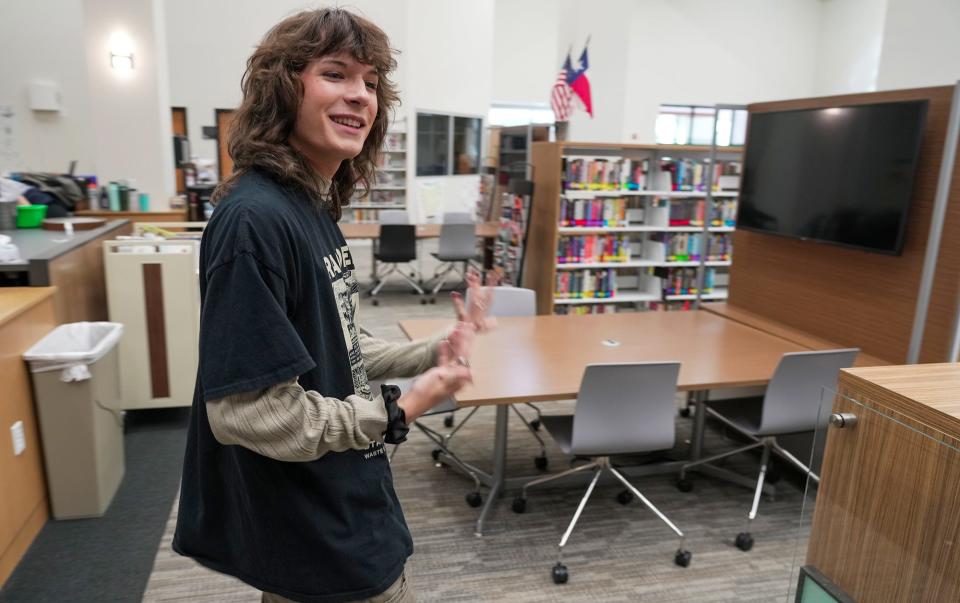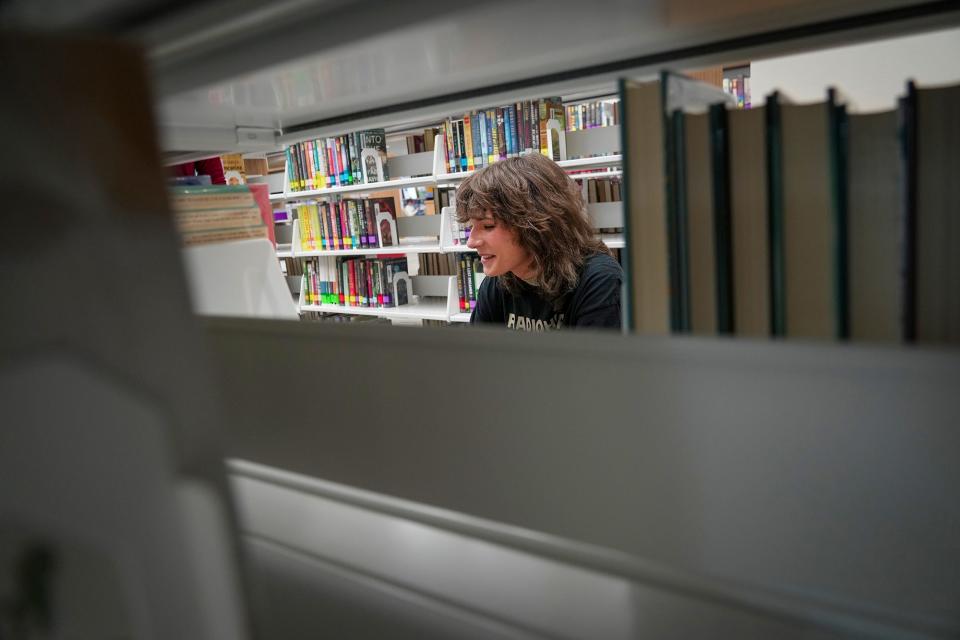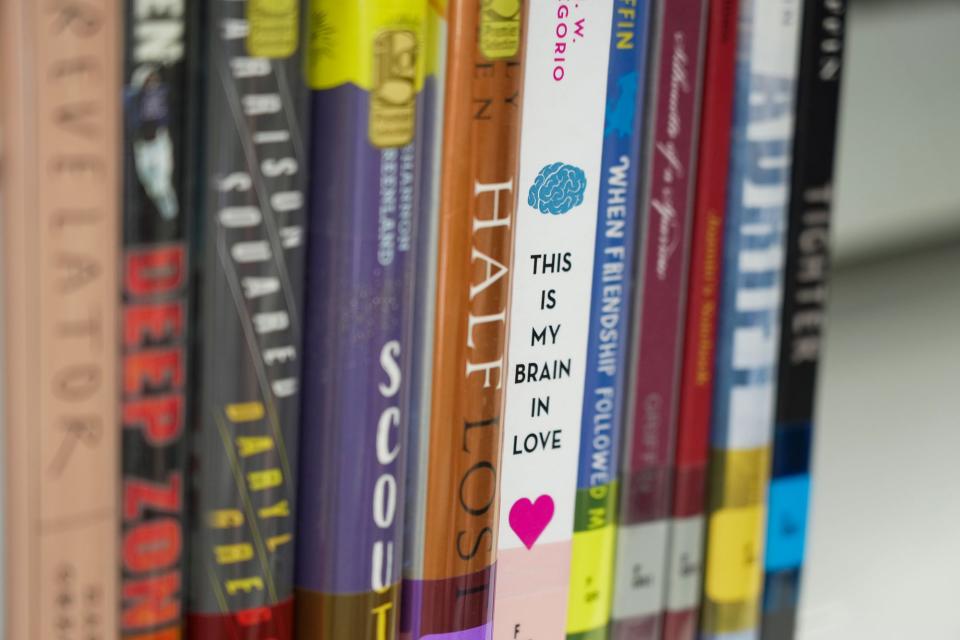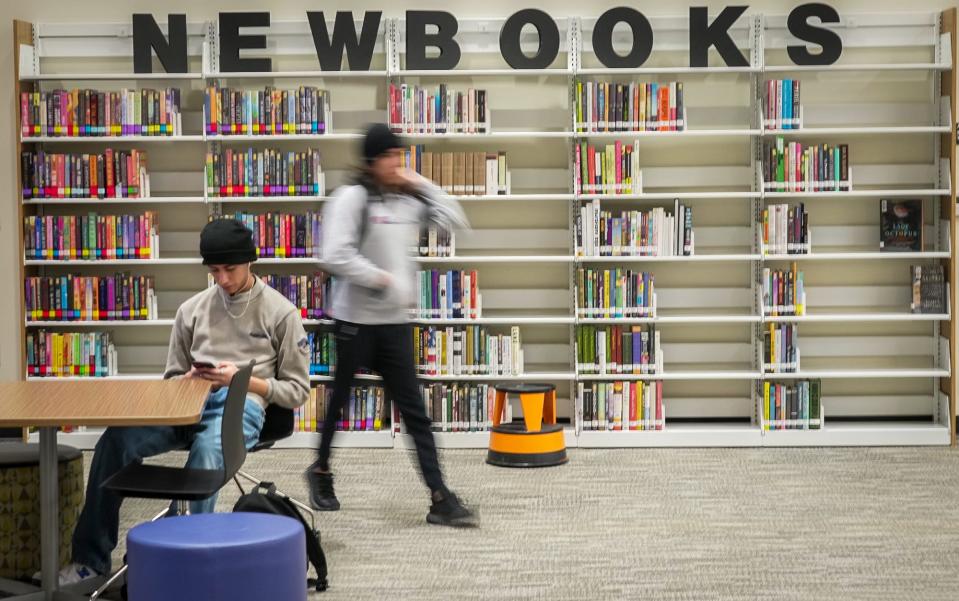Amid challenges, why school library books are important to Austin-area students
When Trey Lauren, a senior at Lake Travis High School, stepped into the library at their school Wednesday, the librarian knew their name.
Lauren made their way to their favorite part of the library — a shelf full of famed horror writer Stephen King's novels. The books are their favorite, and Lauren loves to visit the library, which was popping Wednesday with students working on computers, reading and lounging under colorful posters.
Lately, though, Lauren has been frustrated by conversations about removing books from school libraries. Books have helped Lauren, who is bisexual and nonbinary, learn about their own identity. They worry that the books that have helped them learn about and navigate life might get taken away from others to access.
“That just like struck a chord in me, and I felt like I had to talk about it,” Lauren said. “It irritates me on many levels, not just a personal level but from a First Amendment perspective.”

Lauren and other students are going through school at a time when parent-led challenges to books are heating up at school board meetings, driving state legislation to ban certain content and sparking lawsuits in Texas and across the nation.
For those seeking to ban certain books from school libraries, the renewed focus on the content's appropriateness is essential to protecting students from obscene, even pornographic material. Those complaints resulted in 625 instances of book removals in 12 districts in Texas during the 2022-23 school year, according to the nonprofit PEN America, which promotes free expression. Texas was second to Florida's 1,406 book ban cases during the last school year but well ahead of third-place Missouri, which had 333 bans, according to the nonprofit.
The Texas Legislature also weighed in on the book bans and in May passed House Bill 900 — a law banning sexually explicit material from school libraries and compelling book vendors to rate the appropriateness of books they sell to schools. The law was set to go into effect Sept. 1, but it has been temporarily halted as it awaits its fate in the 5th U.S. Circuit Court of Appeals in New Orleans.
A group of bookstores, including Austin-based BookPeople, filed a suit July 25 in federal court seeking to block the law. They say it violates free speech, is unclear and is unconstitutional as it focuses on a particular type of speech, among other arguments. A U.S. district judge in September granted the booksellers’ request to temporarily halt the law's implementation, and the state appealed almost immediately to the court in New Orleans.
Many students in Austin-area schools, however, find themselves frustrated with the proposed book restrictions and insist that the rules prove adults aren’t taking them seriously as critical thinkers.

'I am mature enough'
Eshnavi Kovvuri, a sophomore at Lake Travis, has been reading all her life. She regularly has conversations with her mom about the books she reads, especially those containing difficult or mature content.
“I know that I am mature enough to be able to get through it maturely and handle it myself,” Kovvuri said. “I'll do research before I read books. Sometimes I'll take a break and I'll reflect. What is this particular thing, and what is the meaning of showing this explicit thing?”
She doesn’t worry about a book changing her thinking or influencing her. Instead, she reads books to learn about experiences she hasn’t had, she said.
“They’re meant to give you a perspective on the world around you,” Kovvuri said. “Without them, we’d be so closed off.”

In working to blunt the effects of book censorship, Vandegrift High School student Nicole Miltonberger and two of her friends started the Banned Book Club in 2022.
Miltonberger, now a senior, and her friends started the club by getting a list of books that had been pulled from library shelves and organizing a student group to read and talk about them. They read titles such as “In the Dream House” and “Kiss Number 8,” she said.
“The kids do actually care about the books that we read in schools,” Miltonberger said. “It's not something that's going over our heads. We do care.”
Miltonberger pushes back against the idea that students shouldn’t read stories containing adult-related themes. She can only live her own life, so books — even those about difficult subjects such as sexual assault — give her a window into others’ experience, she said.
“I'm doing this because I care a lot about my education, and I think a lot of other kids do too,” Miltonberger said. “We're not doing it out of spite for the adults. It's out of our own want to have a say in our own education.”

Talking with parents
Younger students have also been left frustrated by talk about book bans. Both Rand Mathews, a sixth grader at Bee Cave Middle School, and Caitlin Montgomery, an eighth grader at Hudson Bend Middle School, have questions about why adults want to remove certain books from school libraries.
Mathews spends most of his mornings at the school library, hanging out with friends, he said. He loves reading and was a library helper in fifth grade. He hears about book challenges on the news, and they confuse him.
Some books have hard topics, but when he comes across that content, Mathews talks with his mom about it, such as when he read “Maus,” a book about the Holocaust.
“I can see why they wouldn't want a kindergartner reading that stuff,” he said.
Sometimes when a book gets tough, though, he’ll set it aside for a little while.
“I was reading part of that, and it got super sad, and I stopped reading it,” Mathews said.
Montgomery usually talks to her mom about the books she's reading, she said. Some parents might not want their children reading some books, but it's easier for students to find information on the internet than in books, she said.
"I know parents want to shield their kids," Caitlin said. "If you send your kid to a high school, they're going to hear stuff."
Sixth grader Rizah Gulati, who attends Kirby Hall School, a private school, has talked in class about book challenges, he said. Gulati just likes to learn and wants the chance to talk about new things in class, something he wishes adults knew, he said.
"I wish they understood that if you're not teaching us these things, we might do something wrong," Gulati said. "We need to learn this stuff to make sure we know what's happening."

Keeping books on the shelves in schools is important to Lauren, the Lake Travis senior. They decided to speak up at a school board meeting in December when the district considered revising its policy for removing books from the library.
"A lot of queer people, especially in Texas, which is, as you know, a pretty conservative state, feel really, really pressured to hide," Lauren said. "So a lot of us are hiding. Giving us the resources to figure out who or what we are, that can really help us come out of our shells and live a truer life and be happier."
This article originally appeared on Austin American-Statesman: Amid challenges, why library books important to Austin-area students

